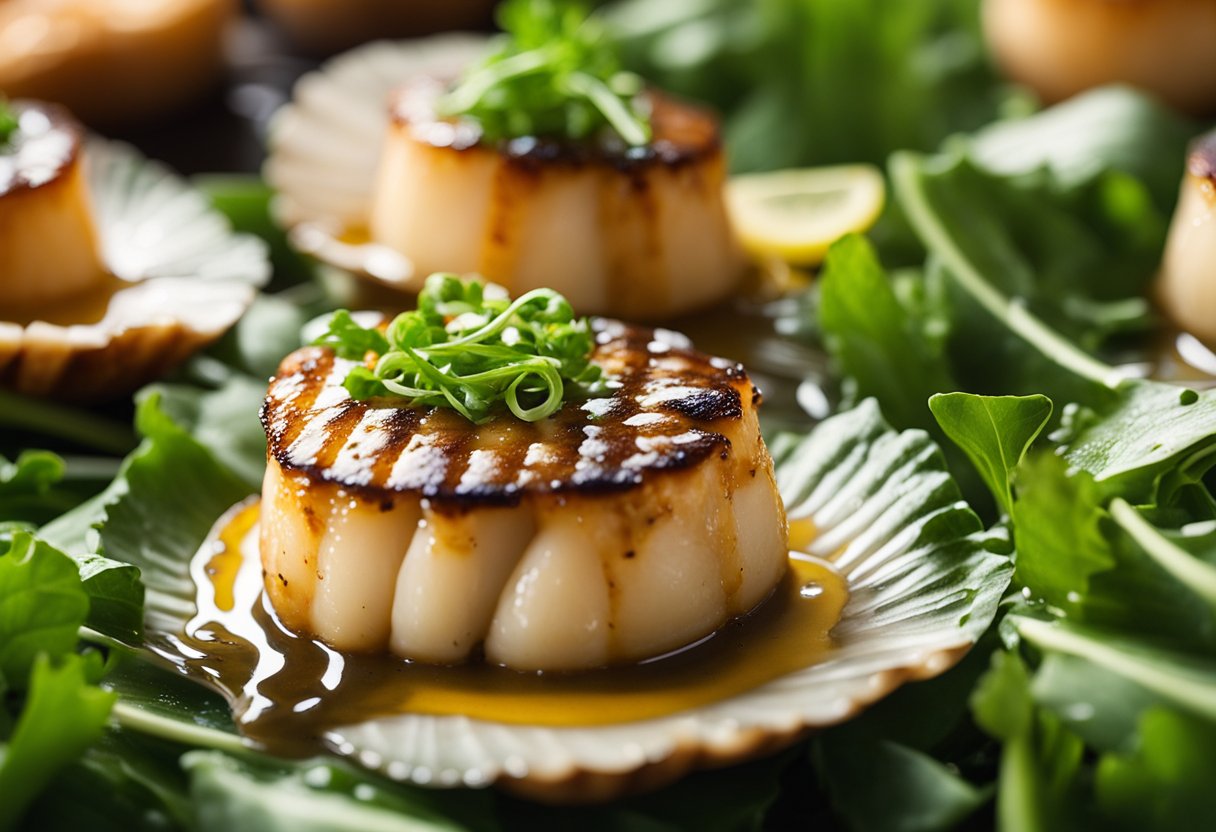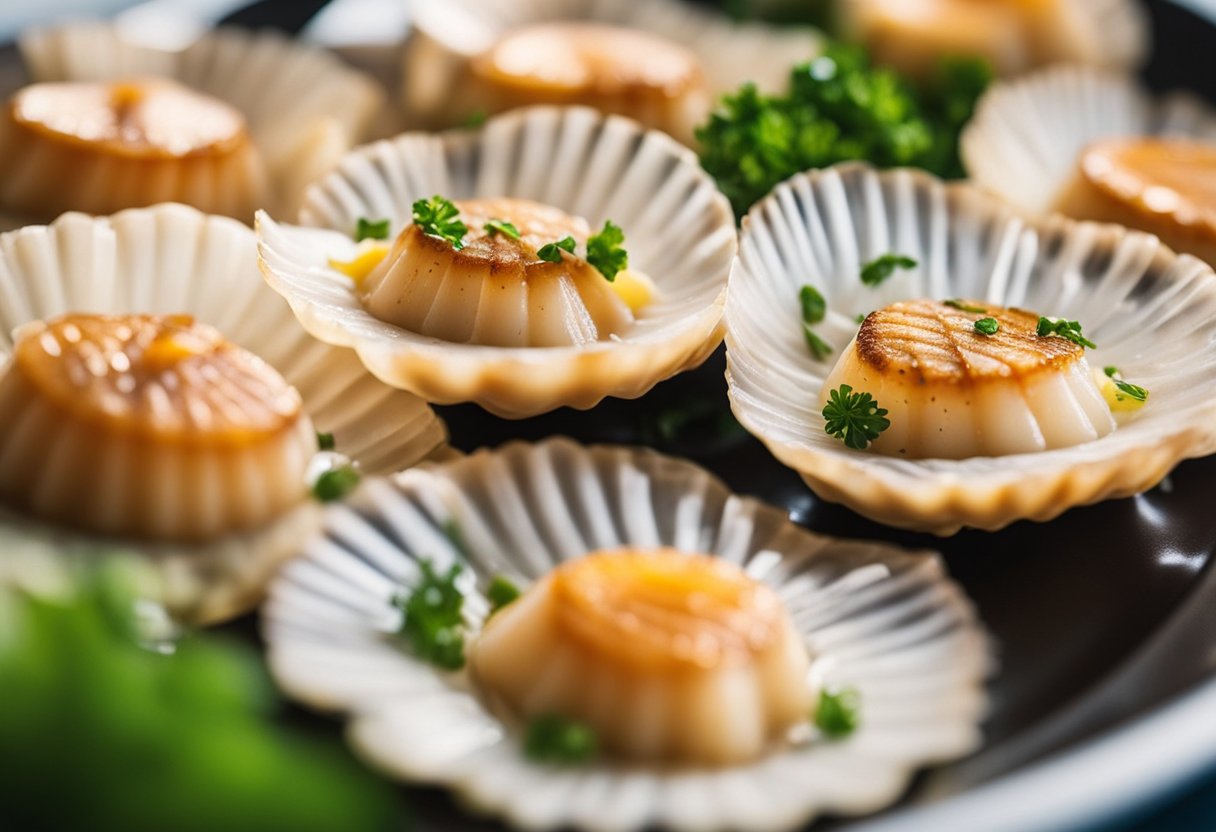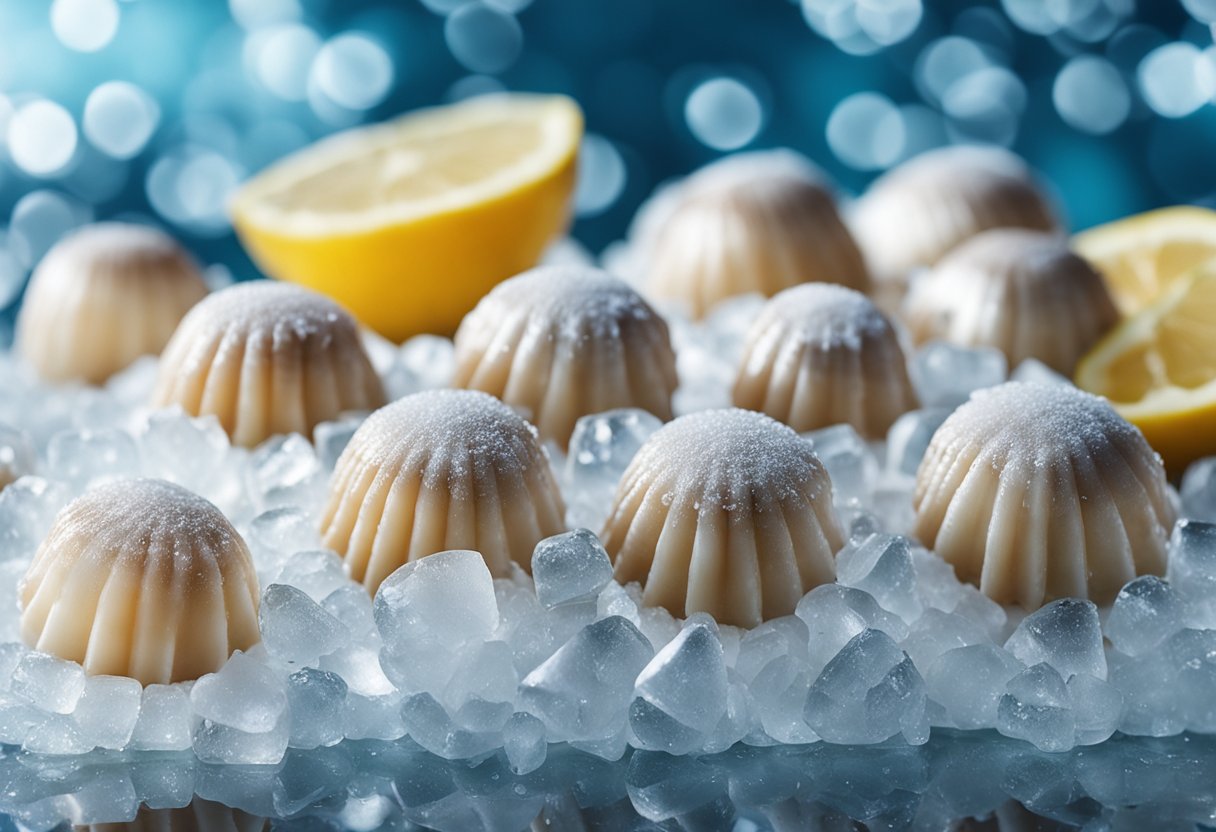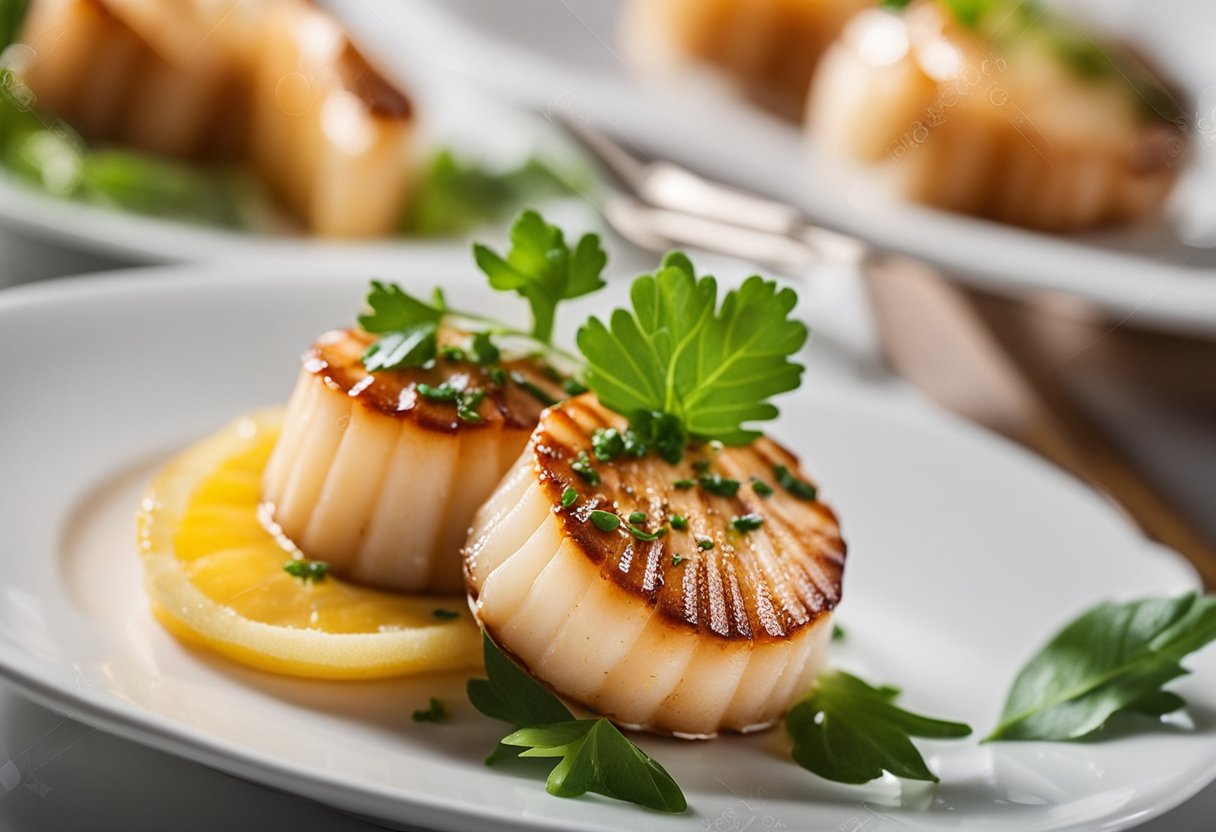Scallops are a type of seafood that have gained popularity in recent years due to their unique taste and versatile nature.
While some people may be hesitant to consume scallops due to concerns about their nutritional value or potential risks, research suggests that scallops can be a healthy addition to your diet.

Scallops are a low-calorie, high-protein food that is also rich in vitamins and minerals such as selenium, zinc, and vitamin B12.
These nutrients can help support a healthy pregnancy, balance hormones, and improve memory. Additionally, scallops contain omega-3 fatty acids, which are beneficial for heart health and physical recovery.
When it comes to consuming scallops, it is important to consider the potential risks and considerations. For example, some people may be allergic to shellfish and should avoid scallops altogether.
Additionally, scallops can accumulate heavy metals, so it is important to choose high-quality sources and limit consumption.
Overall, scallops can be a healthy and delicious addition to your diet when consumed in moderation and with consideration for potential risks.
Key Takeaways
- Scallops are a low-calorie, high-protein food that is rich in vitamins and minerals, including omega-3 fatty acids.
- When consuming scallops, it is important to consider potential risks and choose high-quality sources.
- Overall, scallops can be a healthy and tasty addition to your diet when consumed in moderation.
Nutritional Profile of Scallops

Scallops are a type of shellfish that are popular for their delicate flavor and tender texture. They are also a great source of nutrition, providing a range of vitamins, minerals, and other beneficial nutrients.
Vitamins and Minerals in Scallops
Scallops are particularly rich in vitamin B12, which is essential for maintaining healthy nerve cells and red blood cells.
A 100-gram serving of scallops contains around 20 times the recommended daily intake of vitamin B12. Scallops are also a good source of zinc, which is important for immune function, wound healing, and DNA synthesis.
In addition to vitamin B12 and zinc, scallops contain a range of other minerals, including iron, selenium, potassium, magnesium, phosphorus, and calcium.
These minerals are important for a range of bodily functions, including bone health, muscle function, and nerve function.
Protein and Fat Content
Scallops are a great source of protein, with a 100-gram serving containing around 20 grams of protein. Protein is important for building and repairing tissues in the body, and it is also important for maintaining muscle mass.
Scallops are also relatively low in fat, with most of the fat coming from healthy sources such as omega-3 fatty acids. A 100-gram serving of scallops contains around 1 gram of fat.
Caloric Value of Scallops
Scallops are a relatively low-calorie food, with a 100-gram serving containing around 137 calories. This makes them a great choice for people who are trying to lose weight or maintain a healthy weight.
In addition to their low calorie count, scallops are also a good source of choline, a nutrient that is important for brain function and memory. A 100-gram serving of scallops contains around 40 milligrams of choline.
Overall, scallops are a nutritious and delicious food that can provide a range of health benefits. Whether you are looking to boost your protein intake, increase your vitamin and mineral intake, or simply enjoy a tasty seafood dish, scallops are a great choice.
Health Benefits of Consuming Scallops
Scallops are a type of seafood that are not only delicious but also packed with nutrients that offer numerous health benefits. In this section, I will discuss some of the major health benefits of consuming scallops.
Heart Health Benefits
Scallops are an excellent source of omega-3 fatty acids, which have been linked to improved heart health. Omega-3 fatty acids can help reduce inflammation, lower blood pressure, and reduce the risk of heart disease and stroke.
Scallops also contain taurine, an amino acid that has been shown to improve heart health by regulating heartbeat and circulation.
Weight Loss and Scallop Consumption
Scallops are a low-calorie, low-fat source of lean protein, making them an excellent choice for those looking to lose weight.
They are also rich in nutrients that can help support weight loss, such as vitamin B12 and zinc. Additionally, the high protein content of scallops can help reduce hunger and increase feelings of fullness, making it easier to stick to a calorie-controlled diet.
Scallops and Brain Function
Scallops are rich in nutrients that are essential for brain function, such as omega-3 fatty acids and vitamin B12.
Omega-3 fatty acids have been shown to improve cognitive function and reduce the risk of cognitive decline, while vitamin B12 is essential for the production of neurotransmitters that are necessary for proper brain function.
Scallops and Immune Function
Scallops are a good source of antioxidants, which can help boost immune function and reduce inflammation in the body.
They are also rich in zinc, which is essential for immune function and can help reduce the risk of infections. Additionally, the high protein content of scallops can help support the production of immune cells.
In summary, scallops offer numerous health benefits, including improved heart health, weight loss support, brain function, and immune function. Incorporating scallops into your diet can be an easy and delicious way to support your overall health and wellbeing.
Potential Risks and Considerations

Allergies and Scallops
Scallops are a type of shellfish, and like all shellfish, they can cause allergic reactions in some people. According to the American College of Allergy, Asthma, and Immunology, shellfish allergy is one of the most common food allergies in adults.
Symptoms of a shellfish allergy can range from mild, such as hives or itching, to severe, such as difficulty breathing or anaphylaxis. If you have a shellfish allergy, it is important to avoid scallops and other shellfish.
Mercury Content and Heavy Metals
Scallops are relatively low in mercury compared to other seafood, but they still contain some amount of this heavy metal. Mercury is a toxic substance that can accumulate in the body over time and cause health problems.
The amount of mercury in scallops depends on where they are harvested and how they are prepared.
It is recommended that pregnant women, nursing mothers, and young children limit their consumption of seafood that may contain high levels of mercury.
In addition to mercury, scallops may contain other heavy metals such as lead and copper. These metals can also be harmful if ingested in large amounts.
However, the levels of these metals in scallops are generally low and not a cause for concern.
Cholesterol and Saturated Fat Content
Scallops are relatively low in calories and fat, but they do contain some amount of cholesterol and saturated fat. A 3.5-ounce serving of scallops contains about 58 milligrams of cholesterol and 0.3 grams of saturated fat.
While this is not a significant amount, it may be a concern for people who are trying to limit their intake of these nutrients.
On the other hand, scallops are a good source of protein and contain small amounts of carbohydrates and fiber. They also contain healthy fats such as polyunsaturated and monounsaturated fats, which can have a positive effect on heart health.
Overall, scallops can be a healthy and delicious addition to a balanced diet. However, it is important to be aware of the potential risks and considerations associated with consuming this bivalve mollusk.
Cooking Scallops for Health
Healthy Scallop Recipes
Scallops are a delicious and healthy addition to any meal. There are many ways to prepare scallops that are both tasty and nutritious. Here are a few healthy scallop recipes to try:
- Baked Scallops with Garlic and Olive Oil: This recipe is a simple and delicious way to prepare scallops. Simply combine scallops, garlic, olive oil, and some seasoning in a baking dish and bake in the oven until cooked through. This recipe is low in fat and carbohydrates, making it a great option for those watching their diet.
- Grilled Scallops with Lemon and Herbs: Grilling is a great way to cook scallops, as it adds a smoky flavor and allows the natural sweetness of the scallops to shine through. This recipe combines grilled scallops with a bright and flavorful lemon-herb marinade. This recipe is low in fat and carbohydrates and is a great option for those watching their diet.
- Bay Scallop Ceviche: Ceviche is a dish that is typically made with raw fish that is marinated in citrus juice. This recipe uses bay scallops instead of fish and is a delicious and healthy option for those looking for a light and refreshing meal. This recipe is low in fat and carbohydrates and is a great option for those watching their diet.
Cooking Methods and Their Impact
The way you cook scallops can have an impact on their nutritional benefits. Here are a few cooking methods and their impact:
- Baking: Baking is a healthy way to cook scallops, as it requires little to no added fat. Baked scallops are a great option for those watching their diet.
- Grilling: Grilling is a healthy way to cook scallops, as it adds a smoky flavor and allows the natural sweetness of the scallops to shine through. Grilled scallops are a great option for those watching their diet.
- Broiling: Broiling is a healthy way to cook scallops, as it requires little to no added fat. Broiled scallops are a great option for those watching their diet.
- Pan-Frying: Pan-frying scallops can be a healthy option if you use a healthy fat, such as olive oil or ghee. However, pan-frying can also add unnecessary fat and calories to your meal if you use too much butter or oil.
In conclusion, scallops are a delicious and healthy addition to any meal. There are many ways to prepare scallops that are both tasty and nutritious.
Baking, grilling, broiling, and pan-frying are all healthy ways to cook scallops, but it’s important to use healthy fats and watch your portions to ensure you’re getting the most nutritional benefits from this tasty seafood.
Different Types of Scallops

Scallops are a type of bivalve mollusk that are widely consumed for their delicious taste and nutritional value. There are two main types of scallops: sea scallops and bay scallops.
In this section, I will discuss the differences between these two types of scallops and their impact on health.
Sea Scallops vs Bay Scallops
Sea scallops are larger than bay scallops and have a more tender texture. They are typically found in deeper waters and have a more savory flavor.
Sea scallops are also higher in protein and lower in fat than bay scallops. On the other hand, bay scallops are smaller and have a sweeter, milder flavor. They are usually found in shallower waters and are more tender than sea scallops.
Both sea scallops and bay scallops are rich in vitamins and minerals, including vitamin B12, magnesium, and potassium.
They are also a good source of protein and are low in calories, making them a healthy choice for those looking to maintain a balanced diet.
Scallop Size and Impact on Health
The size of scallops can also have an impact on their nutritional value. Larger scallops tend to have a higher fat content, which can be beneficial for those looking to increase their intake of healthy fats.
However, larger scallops may also contain more pollutants and toxins than smaller scallops, so it is important to choose scallops that are harvested from clean waters.
In addition to their size, the part of the scallop that is consumed can also impact their nutritional value. The adductor muscle, which is the part of the scallop that is commonly eaten, is high in protein and low in fat.
The roe, or eggs, of the scallop are also a good source of protein and are rich in omega-3 fatty acids.
In conclusion, scallops are a healthy and delicious addition to any diet. Whether you prefer sea scallops or bay scallops, they are both rich in vitamins and minerals and are a good source of protein.
When choosing scallops, it is important to consider their size and where they are harvested from to ensure that you are getting the most nutritional value from your meal.
Frequently Asked Questions
What are the nutritional benefits of eating scallops?
Scallops are a great source of several essential nutrients. They are low in calories and high in protein, making them a great option for those looking to increase their protein intake.
They are also a good source of vitamin B12, phosphorus, potassium, and selenium. These nutrients are important for maintaining healthy bones, muscles, and nerves.
Are scallops a good source of protein?
Yes, scallops are an excellent source of protein. In fact, a 3-ounce serving of scallops contains around 20 grams of protein.
This makes them a great option for those looking to increase their protein intake, especially for people who follow a low-fat diet.
How do scallops compare to other seafood in terms of health benefits?
Scallops are a healthy seafood option that offer several health benefits. They are low in calories and high in protein, making them a great option for those looking to maintain a healthy weight.
They are also a good source of several essential nutrients, including vitamin B12, phosphorus, potassium, and selenium.
Compared to other seafood options, scallops are lower in mercury, making them a safer choice for pregnant women and children.
Can scallops be a part of a healthy weight loss diet?
Yes, scallops can be a great addition to a healthy weight loss diet. They are low in calories and high in protein, which can help you feel full and satisfied for longer periods of time.
Additionally, they are low in fat, making them a great option for those looking to reduce their fat intake.
Are there any potential health risks associated with eating scallops?
While scallops are generally safe to eat, there are some potential health risks associated with consuming them.
Raw or undercooked scallops can contain harmful bacteria, which can cause food poisoning. Additionally, some people may be allergic to scallops and should avoid consuming them.
How frequently should scallops be consumed for optimal health benefits?
There is no specific recommendation for how often scallops should be consumed for optimal health benefits. However, incorporating them into your diet a few times a week can provide you with several essential nutrients and help you maintain a healthy weight.
It’s important to note that consuming scallops as part of a well-rounded, balanced diet is key to achieving optimal health benefits.






